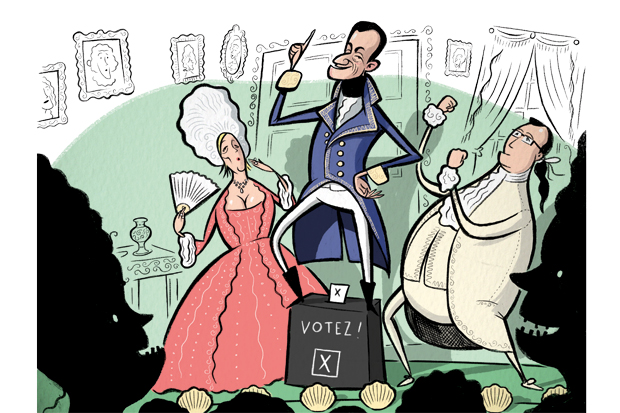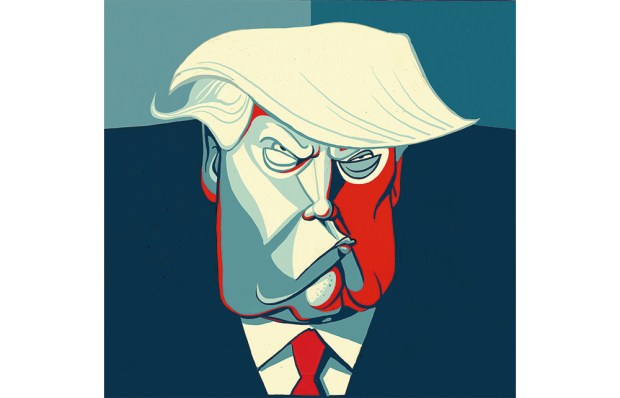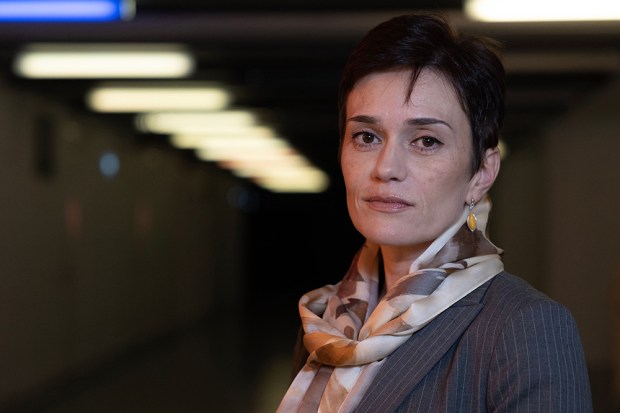In his more hyperactive moods Nicolas Sarkozy, former president of France, has been known to compare himself to Charles de Gaulle. Following defeat in the 2012 presidential elections ‘Sarko’ made a dignified exit from the national stage, stating that in future his personal commitment to the well-being of France would be in some loftier sphere. De Gaulle did the same thing in 1946; he retired to his country estate for 12 years of reflection and study, before being summoned back at a time of national crisis to found the Fifth Republic.
Mr Sarkozy is clearly hoping for a similar resurrection, though there are a number of differences in the two cases. General de Gaulle was never arrested during his years of exile and held for questioning on suspicion of offering bribes to a supreme court judge, as happened to Mr Sarkozy last July. And Sarko’s exile lasted for less than 12 months. Since during that time the only summons he received was to the police station, he decided to summon himself — back to the presidential throne.
He gave the first sign of this intention last November when his wife, the pop singer Carla Bruni, made a concert tour of French cities to launch an album. The cities selected tended to be places where her husband enjoyed a degree of popularity, and sure enough Sarko was often to be found popping up beside her, waving to the fans. He confirmed his comeback decision on Facebook two months ago, when he declared himself a candidate for the presidency of his old party, the centre-right UMP, and, unless disaster strikes, he will be elected to that position this weekend.
But the Sarko comeback tour has been a shambles. It has divided the party and embittered many of those he will have to work with if he is ever returned to power. When this is taken together with the chronic inadequacy of President François Hollande’s performance, France’s democratic system now appears to be approaching brain death.
The President’s approval rating has sunk to around 12 per cent, the economy is in perpetual crisis, with unemployment at record levels, and then there is nonexistent growth, mounting public debt, and a budget deficit of €84 billion. Each quarterly report proves worse than the one before, and there is no sign that any of those in power know what to do about it.
In August, after Prime Minister Manuel Valls carried out a cabinet reshuffle which amounted to a massacre of his own left wing, the new man in charge of the ministry of trade and tourism had to resign after nine days when it was discovered that for the last three years he had omitted to pay any taxes. Naturally his previous appointment had been as vice-president of a government commission on tax evasion.
To make matters worse, the most effective opposition is displayed by Marine Le Pen, leader of the far-right National Front. According to recent opinion polls, Madame Le Pen is the political leader most likely to enter the second round of the 2017 presidential election — where, if her opponent is President Hollande, she will win.
In this situation the UMP should be in clover: the party was founded back in 2002 supposedly to overcome the threat offered by the National Front. But it too is in crisis. It has no clear policies and no idea of where its future lies. It is widely acknowledged that this unhappy state of affairs has largely been brought about by the ruthless and cynical behaviour of Mr Sarkozy, which makes it all the more absurd that he has returned to take charge. He is implicated in six criminal investigations, including charges of corruption and influence-peddling. In response he claims to be ‘a wounded animal hunted by Socialist judges’. The similarities with Silvio Berlusconi are striking.
It is now clear that when he was pretending to retire in the summer of 2012, Sarko was already preoccupied with his return to power. His first goal was to ensure that no rival strongman emerged at the head of the UMP. The man most likely to succeed him was his former prime minister François Fillon. So Sarko came to an arrangement with another ex-minister, Jean-François Copé. Mr Copé duly defeated Mr Fillon and was elected as president of the UMP, but only after bitter allegations of election fraud. Subsequently Mr Copé was forced to resign amid allegations connecting him to the submission of €12 million of falsified expenses in Nicolas Sarkozy’s 2012 unsuccessful presidential campaign. Mr Sarkozy was questioned in the course of the same inquiry, which is still under judicial investigation.
Following this setback the remaining leadership of the UMP tried to put their house in order. François Fillon and Alain Juppé, another former prime minister, announced that before the next presidential election in April 2017 there should be primary elections to select one right-wing candidate for the first round. This was to ensure that a less extreme candidate would qualify for the run-off and thus terminate the chances of Marine Le Pen. Fillon and Juppé further announced that they would both be running in this primary and that the new president of the UMP, who would be administering it, should not himself be eligible to run.
Mr Sarkozy immediately saw their mistake. He realised that he could outmanoeuvre his rivals by running for the party presidency himself. As party president, he could rewrite the new rules and then stand when the time came.
His opponents in the UMP are now huddling around Juppé, the mayor of Bordeaux. Sarko in reply has increased the stakes by moving towards the far right, intending to outflank Le Pen and win back Catholic conservatives. Should he be re-elected, he has vowed to overturn François Hollande’s gay marriage laws and he has denounced the open borders of the Schengen Treaty. None of this will attract centre-right votes, without which no UMP candidate can win.
But Mr Sarkozy is in a tight spot. He is well aware that a political noose is tightening around his neck. The Socialist government wants to put him in the dock. His former colleagues in the UMP will do nothing to stop them. By May 2017 Sarko could find himself back in the Elysée… or behind bars. Marine Le Pen is delighted.
Got something to add? Join the discussion and comment below.
Get 10 issues for just $10
Subscribe to The Spectator Australia today for the next 10 magazine issues, plus full online access, for just $10.
Patrick Marnham has been literary editor of The Spectator and Paris correspondent of the Independent, and a biographer of Simenon, Diego Rivera and Private Eye.
You might disagree with half of it, but you’ll enjoy reading all of it. Try your first month for free, then just $2 a week for the remainder of your first year.














Comments
Don't miss out
Join the conversation with other Spectator Australia readers. Subscribe to leave a comment.
SUBSCRIBEAlready a subscriber? Log in